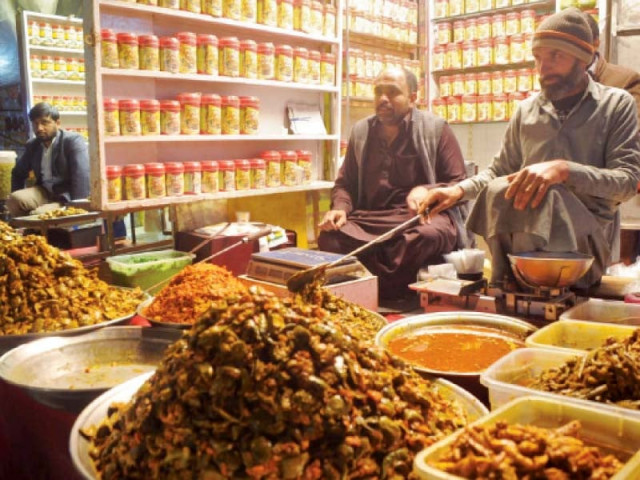Pickles do roaring trade in Talwaran Bazaar
Pre-partition era shops maintain taste, tradition

The essence of the pickle shops established in the Talwaran Bazaar of Rawalpindi since the pre-partition days remains wholesome and untarnished to this day.
So widespread is the fame of the sweet and sour pickles produced here that the relishes are exported to Iran, Turkey, China and other countries of the world.
These pickles made from mangoes, lemons, carrots, garlic, green peppers and other ingredients are second to none.
Abdul Hamid, who runs the shop originally set up by his grandfather in Talwaran Bazaar, told The Express Tribune that his pickle shop is in existence since before the formation of Pakistan.
After his grandfather, Hamid’s father and then he himself took over the business one after the other. “The shop turns over a considerable tidy profit,” he said.
He recalled that when people used to fill their belly with pickles accompanied by roti twice a day in earlier times, not only did they remain healthy and hearty but also managed to do so without burning a hole in their pocket.
Today, skyrocketing inflation has compelled low-income families to revert to the same tradition of making filling meals out of pickles and roti in an effort to rein in the spiralling kitchen costs, leading to an ever-increasing demand for the relishes.
Hamid further said that with the passage of time, the process of pickling has also been modernised, with the product that used to take months to prepare now ready for consumption much sooner thanks to edible-grade chemicals utilised in the procedure.
“We make sure that the time we now save does not compromise the taste and flavours of our pickles,” affirmed Hamid, who added that pure mustard oil is essential in the preparation of pickles.
“The primary reason for the popularity of old and famous pickle shops in Rawalpindi is that the pickles are made in pure mustard oil, which is a great source of energy and does not put any strain on the digestive system either,” he said.
As many as 18 types of pickles can be found in the ancient shops of Rawalpindi. These varieties include white gram pickle, onion pickle, cabbage pickle, sour and sweet pickle, carrot pickle, falsa pickle, bitter gourd pickle, spinach pickle, turnip pickle, ginger pickle, garlic pickle, cassava pickle, mango pickle, dailla pickle, vinegar pickle, green chilli pickle and lasora pickle.
Prices vary for different types of pickle, ranging from Rs280 per kg to a maximum high of Rs600 per kg.
While busy choosing which pickles to buy, customer Mohammad Jamshed remarked that until recently, the consumption of pickles was limited to enhancing the flavour of a dish and to improve digestion. However, the relish is now gradually replacing entire meals as a more basic yet fulfilling substitute in the wake of ever-increasing inflation.
Shagufta Bibi, another customer, told The Express Tribune that her family have been loyal clients of the old pickle shops in Talwaran Bazaar for generations and claimed that the pickles taste the same today as they did 20 years ago.
“More and more households are returning to the tradition of making meals out of pickles,” she agreed. “But at my home, these pickles from Talwaran have always been a staple.”
According to medical practitioner Dr Tahir Sheikh, consuming pickles strengthens the body's immune system, prevents anaemia and helps ward off visual impairment.
“The garlic and green chillies usually found in pickled concoctions are beneficial for diabetics,” said Dr Tahir. “Pickles are a vital source for a lot of vitamins and are also good for patients attempting to lower their cholesterol levels.”
He concluded that pickles are a healthy and affordable source of nutrition and energy.
Published in The Express Tribune, February 9th, 2022.



















COMMENTS
Comments are moderated and generally will be posted if they are on-topic and not abusive.
For more information, please see our Comments FAQ